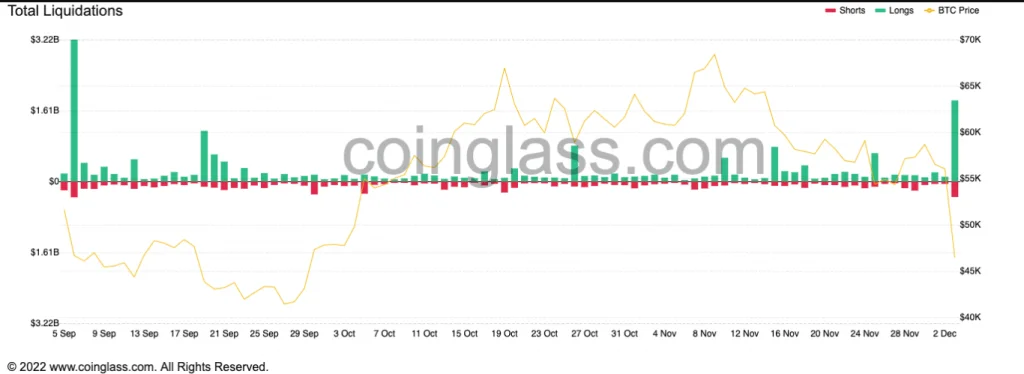As volatility strikes, the price of Bitcoin has dropped to two-month lows. But, with the price of Bitcoin hovering around $42,000, could the bottom be in?

Bitcoin (BTC) has dropped below $47,000 in the last 24 hours, dropping roughly 20% of its value. This is the greatest one-day decrease since May 15, when the price of Bitcoin fell to roughly $33,000 for a brief period.
BTC’s market price dropped 26.4 % from its week-long support of $57,206 to $42,268 before returning to the $45k barrier. According to ByBit statistics, the Bitcoin market saw $1.3 billion in total liquidations in the last hour, with $735 million in BTC longs liquidated as a result of the decrease.

As a consequence, Bitcoin’s bear market cancels out the two-month-long bull market that began on September 29 and ended on November 8, when BTC climbed over 63 % to an all-time high of $67,602. However, several Bitcoin observers, like TechDev, have seen a consistent pattern in Bitcoin’s price activity throughout the years.
Every #Bitcoin cycle in history has ended with a red month followed by 2 or 3 very green months. pic.twitter.com/zr1055PvkL
— TechDev (@TechDev_52) October 18, 2021
Another factor contributing to Bitcoin’s two-month losing run is widespread pushback from US authorities, who have called the CEOs of key crypto exchanges like as FTX and Binance US to testify at a hearing on crypto-assets.
Some, on the other hand, feel that Bitcoin’s price has stabilized following its recent dip. Michaal van de Poppe, CEO of crypto educational platform Eight Global, for example, stated:
Bottom is in.
— Michaël van de Poppe (@CryptoMichNL) December 4, 2021
Despite worries about volatility and noncompliance with standard banking norms, Bitcoin remains a potential asset for countries with shaky economies. Zimbabwe’s government is contemplating adopting Bitcoin as a mainstream currency, following in the footsteps of El Salvador. El Salvador buys 150 bitcoins when the price of bitcoin falls below $50,000.
The authorities plan to adopt legislation to safeguard customers from financial concerns such as unregistered cross-border transfers, money externalization, and money laundering, according to Wekwete.
